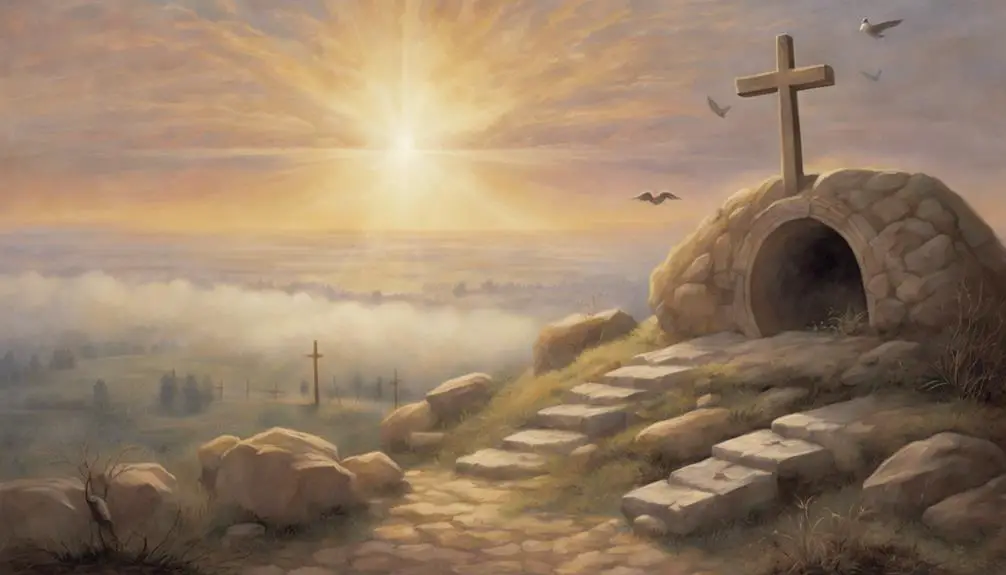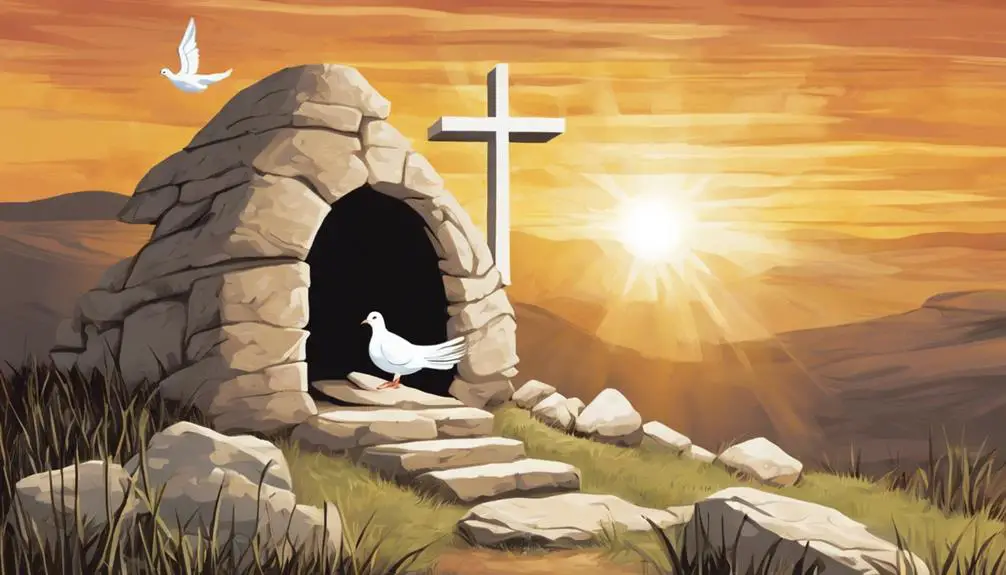Open your heart to the myriad of Bible verses discussing Jesus' resurrection, and discover new insights into this pivotal event in Christian faith.

What Bible Verse Talks About Jesus Resurrection
Did you know that there are over 100 verses in the New Testament that mention Jesus' resurrection? It's a central theme, and each account offers unique insights.
In Matthew 28, for instance, you're told about the empty tomb and the angel's announcement.
But why stop there? What other verses contribute to this crucial narrative? Let's embark on this scriptural journey together, to uncover the various perspectives on this significant event.
Who knows what revelations you might discover along the way?
Key Takeaways
- The Gospels – Matthew 28, Mark 16, Luke 24, and John 20 – detail Jesus' resurrection, affirming His identity as the Messiah.
- Post-resurrection encounters in Mark 16 and John 20 authenticate Jesus' resurrection through angel appearances and the empty tomb.
- Luke 24 and 1 Corinthians 15 underscore the theological significance of Jesus' resurrection, central to Christian faith and belief.
- 1 Corinthians 15 recounts resurrection appearances to various witnesses, crucial to validating Jesus' resurrection and His identity as the Son of God.
The Crucial Moment in Matthew 28

In the pivotal chapter of Matthew 28, you encounter the transformative moment of Jesus' resurrection, a cornerstone event in Christian theology. This chapter reveals a narrative that's rich with spiritual symbolism, theological implications, and historical contexts. The resurrected Christ becomes the embodiment of a new covenant, one that transcends death and promises eternal life.
As you delve into the text, you'll notice that the resurrection isn't an isolated event, but rather a culmination of prophecies, miracles, and teachings. It's a clear fulfillment of Jesus' own predictions about his death and revival, lending credibility to his divine nature and mission. The events of this chapter, particularly the resurrection, solidify Jesus' identity as the Messiah, the Son of God.
The significance of the resurrection extends beyond its theological implications. It's also a beacon of hope, a testament to divine love and power. It's a reminder that in the face of death and despair, there's promise of new life. As you engage with Matthew 28, you're invited to contemplate the profound mysteries of faith, and the transformative possibilities of belief and surrender.
Mark 16: Resurrection Account

Turning your attention to Mark 16, you'll uncover another compelling account of Jesus' resurrection, complete with its own unique perspectives and insights. This chapter conveys the tale through the eyes of Mary Magdalene, Mary the mother of James, and Salome, who venture to Jesus' tomb on the first day of the week.
Upon reaching the site, they're met with an unexpected sight: the stone has been rolled away, and an angelic figure dressed in white sits inside the open tomb. The figure delivers the astounding news that Jesus, who they're seeking, isn't here; He's risen. This message conveys Jesus' resurrection in a way that's both direct and profound.
Mark 16 also presents intriguing post-resurrection appearances of Jesus. He first appears to Mary Magdalene herself, then to two disciples walking in the country, and finally to the Eleven. These encounters reinforce the authenticity of His resurrection, while showcasing His continuing influence and guidance.
Luke 24: Jesus' Triumph Over Death

Venturing into Luke 24, you'll find an immersive account of Jesus' triumphant resurrection, a pivotal event heralding His victory over death. Here, Luke vividly portrays Jesus' post-resurrection interactions with His disciples. You'll observe how Jesus, initially unrecognized by His followers, reveals Himself through the breaking of bread, a moment that's both dramatic and deeply symbolic.
This chapter is replete with themes of revelation and recognition. The two disciples on the road to Emmaus don't recognize Jesus until He breaks bread with them. Similarly, the gathered disciples initially mistake Jesus for a spirit, but He reassures them by showing His wounds and eating food, thereby asserting His physicality.
Luke 24 also emphasizes the fulfillment of prophecies. Jesus elucidates how His suffering, death, and resurrection were foretold in the Scriptures, specifically 'in the Law of Moses, the Prophets and the Psalms' (Luke 24:44). His resurrection isn't a random occurrence; it's a divine plan unfolding as prophesied.
In essence, Luke 24 serves as a testament to Jesus' victory over death, His identity as the Messiah, and the fulfillment of prophetic Scriptures. This narrative, profound and poignant, underscores the transformative power of Jesus' resurrection.
John 20: The Empty Tomb

As you delve into John 20, you'll encounter the thrilling account of the empty tomb, a silent yet powerful testimony to Jesus' resurrection. On the first day of the week, Mary Magdalene visits the tomb to find the stone rolled away. She rushes to tell Peter and John, who subsequently run to the tomb themselves. They find it empty, with the burial cloths left behind, affirming the truth of Jesus' resurrection.
To further illustrate this, consider the following table which outlines the key events and characters in this account.
Event |
Character |
Significance |
|---|---|---|
Discovery of empty tomb |
Mary Magdalene |
First witness of resurrection |
Verification of empty tomb |
Peter and John |
Affirmation of the resurrection |
Appearance of Angels |
Two Angels |
Confirmation of Jesus' ascension |
John 20 is more than an account of an empty tomb; it's a proclamation of victory over death. The resurrection of Jesus is central to Christian faith, symbolizing hope, redemption, and the promise of eternal life. This narrative serves to affirm that belief, reinforcing the power and significance of Jesus' resurrection.
1 Corinthians 15: The Risen Christ

Continuing our exploration, let's now examine Corinthians 15, a crucial chapter that provides a detailed account of the risen Christ. Penned by the Apostle Paul, this chapter is renowned for its comprehensive theology of the resurrection.
In verses 3-8, Paul recounts the resurrection appearances of Jesus, stressing their historical veracity. He insists that Christ died for our sins, was buried, rose on the third day, and appeared to numerous witnesses – first to Peter, then to the twelve apostles, and finally to more than 500 followers. These events are presented not as myths or spiritual allegories, but as actual occurrences that can be corroborated by living witnesses.
You'll notice in verses 12-19, Paul argues that if Christ hasn't been raised, then our faith is in vain and we're still in our sins. The resurrection, therefore, isn't just a peripheral doctrine, but central to the Christian faith. It validates Jesus' identity as the Son of God, substantiates His teachings, and offers hope for our own resurrection. Corinthians 15 thus underscores the fundamental importance of the resurrection in Christian belief and practice.
Conclusion
In conclusion, you've journeyed through the Bible's accounts of Jesus' resurrection, from Matthew, Mark, Luke, and John, to Paul's letter to the Corinthians. These scriptures affirm Jesus' triumph over death, the empty tomb, and his rise as the Risen Christ.
You've gained a deeper understanding of this central Christian belief, demonstrating the enduring power and hope of the resurrection story. Continue to delve into these passages to further enrich your faith and knowledge.



Sign up